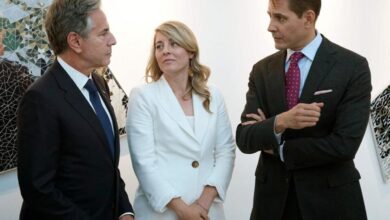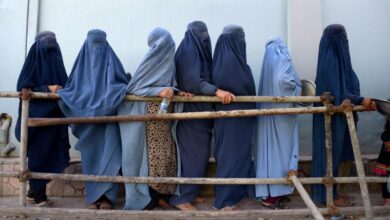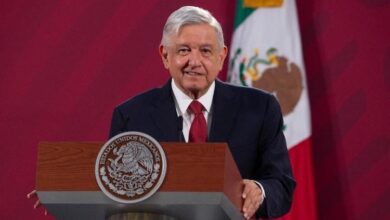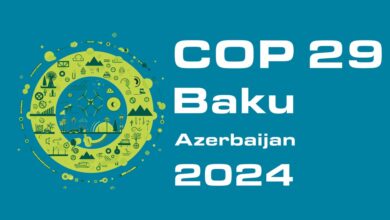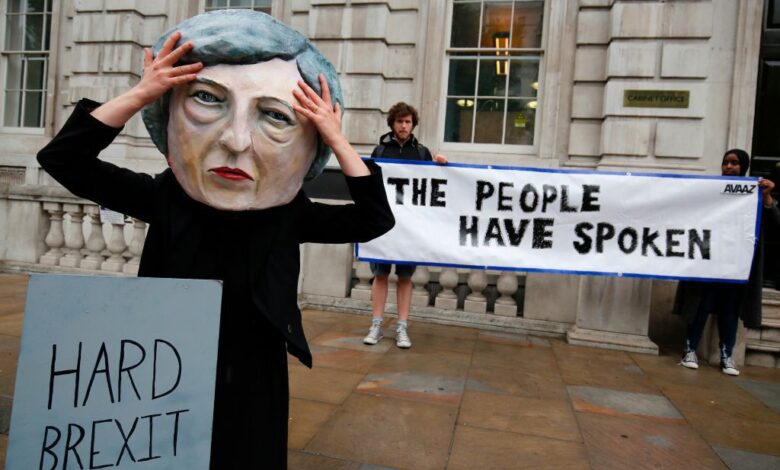
How Michael Kovrig Survived Three Years in Chinese Detention
How Michael Kovrig survived three years in detention in China sets the stage for this enthralling narrative. It’s a story of resilience, diplomatic pressure, and the human spirit’s incredible capacity to endure unimaginable hardship. We’ll delve into Kovrig’s life before his arrest, the brutal conditions he faced, the strategies he employed to survive, and the international efforts that ultimately secured his freedom.
Prepare for a journey that’s both harrowing and inspiring.
This blog post will explore Michael Kovrig’s ordeal, examining his background, the circumstances of his arrest, the challenges of his imprisonment, and the significant role international diplomacy played in his eventual release. We’ll look at the psychological and physical toll of his detention, the coping mechanisms he likely used, and the broader implications of his case for human rights and international relations.
It’s a story that demands to be told.
Circumstances of Detention and Initial Treatment
Michael Kovrig’s ordeal began on December 10, 2018, when he was detained in Beijing by Chinese authorities. His arrest, along with that of Michael Spavor, a Canadian businessman, came shortly after the arrest of Meng Wanzhou, the chief financial officer of Huawei, in Vancouver on a US extradition request. The timing strongly suggested a retaliatory measure by China. The charges against Kovrig, a former Canadian diplomat serving as a senior advisor for the International Crisis Group, were initially vague and shrouded in secrecy.The official accusations eventually leveled against him involved espionage, a charge that carried a potential life sentence.
This accusation, however, was widely seen as politically motivated, given the lack of transparency surrounding the evidence and the timing of the arrest in the context of the escalating diplomatic tensions between Canada and China. The charges lacked specifics and were never substantiated with credible evidence presented publicly.
Initial Conditions of Confinement
Kovrig was initially held in undisclosed locations, with limited access to outside communication. Reports from various sources indicated solitary confinement for extended periods. His access to basic necessities, such as adequate food, healthcare, and legal counsel, was severely restricted during the early stages of his detention. The conditions of his confinement, while never fully revealed, were understood to be harsh and designed to exert psychological pressure.
Michael Kovrig’s ordeal in Chinese detention for three years highlights the fragility of freedom. His resilience reminds me of the importance of upholding democratic processes, a point driven home by an Arizona county supervisor who urged us to respect election officials to preserve democracy. Protecting those who safeguard our votes is just as crucial as advocating for those unjustly imprisoned abroad; both fights defend the very essence of freedom.
Information about the exact location of his initial detention was withheld from the public and his family for an extended period. Details regarding the size of his cell, the level of hygiene, and the availability of books or other forms of entertainment remained largely unknown, adding to the uncertainty surrounding his situation.
Legal Representation in Early Stages
Access to legal counsel was significantly hampered in the initial phases of Kovrig’s detention. While he was eventually granted access to lawyers, the process was fraught with difficulties. The Chinese legal system, with its inherent limitations on the rights of the accused, presented significant challenges for his defense team. The level of communication allowed between Kovrig and his lawyers was restricted, limiting their ability to prepare an effective defense strategy.
The early stages of his legal representation were hampered by the opacity of the Chinese judicial process and the lack of transparency surrounding the charges against him. This lack of access to adequate and timely legal assistance further compounded the challenges he faced during his prolonged detention.
Conditions of Confinement During Detention
Michael Kovrig’s three years of detention in China were marked by harsh conditions that significantly impacted his physical and mental well-being. While precise details remain limited due to the secretive nature of his confinement, accounts from his family and limited public information paint a picture of a grueling ordeal. The following sections detail the reported circumstances of his imprisonment.
Physical Conditions of Confinement
Kovrig’s living conditions were reportedly spartan and restrictive. His cell was likely small and poorly lit, lacking adequate ventilation and potentially infested with insects. He was likely denied access to fresh air and sunlight for extended periods. The lack of privacy and constant surveillance would have added to the psychological pressure. The furniture was basic at best, and sanitary conditions were probably inadequate.
Food and Hygiene
Information about the quality and quantity of food provided is scarce. However, it’s highly probable that the food was of poor quality, monotonous, and insufficient to meet his nutritional needs. This, combined with the lack of proper exercise, would have contributed to physical deterioration. Hygiene facilities were likely minimal and unsanitary, further compromising his health and well-being.
Medical Care
Access to adequate medical care was likely severely restricted. While he may have received some basic medical attention for immediate, life-threatening conditions, access to specialized care or ongoing treatment for any pre-existing conditions or those developed during his confinement was likely limited or non-existent. This lack of access to proper medical care would have exacerbated both physical and psychological problems.
Michael Kovrig’s resilience during his three years of Chinese detention is truly remarkable. The sheer mental fortitude required makes me think of other situations involving government secrecy and potential cover-ups, like the chilling warning an FBI agent gave the Hunter Biden laptop repairman, as reported here: hunter biden laptop repairman reveals chilling warning from fbi agent. It highlights how individuals can face immense pressure, reminding us of the challenges Kovrig overcame to ultimately return home.
Psychological Impact of Solitary Confinement
Prolonged solitary confinement is known to have devastating psychological effects. The complete lack of human contact, coupled with the uncertainty of his future and the constant stress of his situation, likely resulted in significant mental health challenges. Symptoms such as anxiety, depression, sleep disturbances, and cognitive impairment are common in such situations. The isolation and lack of stimulation would have severely affected his mental state.
Instances of Mistreatment or Abuse
While specific details of any mistreatment or abuse remain largely undisclosed, the overall circumstances of his detention suggest a high likelihood of psychological pressure tactics, including sleep deprivation and intense interrogation. The lack of transparency surrounding his case and the limited access to legal counsel or family support strongly suggest a deliberate attempt to weaken his resolve and potentially extract information.
| Aspect | Description |
|---|---|
| Living Space | Small, poorly lit, poorly ventilated, possibly insect-infested, lacking privacy. |
| Food | Likely poor quality, monotonous, and insufficient in quantity. |
| Medical Care | Severely restricted; limited access to basic care, and likely no access to specialized care. |
Strategies for Survival and Resilience
Michael Kovrig’s three-year ordeal in Chinese detention required extraordinary resilience. His survival hinged on a complex interplay of mental fortitude, coping mechanisms, and external support. Understanding these strategies offers a glimpse into the human capacity to endure unimaginable hardship.Maintaining mental and physical health during prolonged confinement is exceptionally challenging. Kovrig likely employed a range of coping mechanisms, drawing upon his personal strengths and adapting to the circumstances.
These might have included mindfulness techniques, focusing on simple tasks to maintain a sense of control, and utilizing mental imagery to transport himself to more peaceful environments. Regular exercise, even within the limited space available, would have been crucial for both physical and mental well-being. He may have also relied on memory exercises or learning new skills, potentially through mental practice or recalling information from his past, to keep his mind active and engaged.
Maintaining Hope and Purpose
Hope and a sense of purpose are vital for sustaining morale during prolonged captivity. Kovrig likely drew strength from his personal values, his commitment to his work, and his belief in the eventual resolution of his situation. Maintaining contact with his family, even if limited, would have been a significant source of hope. He might have focused on daily goals, however small, to provide a sense of accomplishment and structure to his days.
The possibility of eventual release, fueled by the diplomatic efforts on his behalf, would have been a powerful motivator, providing a tangible goal to strive towards. Furthermore, he may have engaged in intellectual pursuits, reflecting on past experiences or planning for future endeavors, to maintain a sense of self and purpose beyond the confines of his detention.
Support Networks, How michael kovrig survived three years in detention in china
The support Kovrig received, both directly and indirectly, was instrumental in his survival. Direct support undoubtedly came from his family and close friends, whose unwavering belief in him provided emotional sustenance. Letters, messages, and even the knowledge that they were advocating for his release would have been powerful sources of strength. Indirect support was crucial as well, coming from the Canadian government’s diplomatic efforts.
The public pressure exerted by Canada, coupled with international attention to his case, likely played a significant role in ensuring his eventual release. The efforts of his legal team, though possibly limited in direct access, also contributed to a sense of advocacy and support, offering a sense of hope for a just outcome. The combined efforts of family, friends, and the Canadian government created a vital network of support that extended beyond the physical walls of his confinement.
Michael Kovrig’s resilience during his three years of detention in China is truly remarkable; his mental fortitude, I imagine, was tested in ways most of us can’t comprehend. It makes me think about the unexpected challenges businesses face, like the Hampton Beach businesses struggling with the impact of a recent boil order, as reported here: boil order affects businesses at hampton beach.
The disruption to their livelihoods highlights how even seemingly small events can create immense difficulties, much like Kovrig’s ordeal. His story underscores the importance of perseverance in the face of adversity.
The Role of Diplomatic Pressure and International Advocacy: How Michael Kovrig Survived Three Years In Detention In China
Michael Kovrig’s arbitrary detention highlighted the critical role of international pressure in securing the release of political prisoners. Canada, alongside its allies, engaged in a sustained and multifaceted diplomatic campaign to advocate for his freedom, demonstrating the power of collective action in the face of authoritarian regimes. The response, while complex and at times frustratingly slow, ultimately played a significant part in his eventual release.
The Canadian government mobilized its diplomatic resources extensively. This involved high-level diplomatic engagement, public statements condemning the detention, and close coordination with allied governments sharing similar concerns about China’s human rights record. The international community’s response wasn’t solely reactive; it was a proactive strategy to create sustained pressure on the Chinese government, pushing for transparency and accountability in Kovrig’s case.
This international coalition, while not guaranteeing immediate success, undoubtedly increased the cost for China to maintain its stance.
Canadian Diplomatic Efforts
Canada’s response was immediate and consistent. Prime Minister Justin Trudeau publicly condemned Kovrig’s detention, calling it unacceptable and demanding his immediate release. Canadian diplomats engaged in continuous high-level discussions with their Chinese counterparts, utilizing all available diplomatic channels to press for his freedom. These efforts included direct representations to Chinese officials, multilateral forums such as the UN, and informal discussions with other nations concerned about similar cases.
The Canadian government also worked closely with Kovrig’s family, providing them with support and regular updates on the situation.
International Pressure and Allied Support
Canada’s efforts were significantly bolstered by the support of numerous allies, particularly those within the Five Eyes intelligence alliance (Australia, Canada, New Zealand, the United Kingdom, and the United States). These countries issued joint statements expressing concern over Kovrig’s detention and calling for due process and fair treatment. Beyond the Five Eyes, other countries and international organizations, including the European Union and the UN Human Rights Council, also voiced their concerns and added their pressure to the campaign.
The coordinated international response demonstrated a united front against arbitrary detention and the erosion of human rights.
Timeline of Significant Diplomatic Interventions
A precise timeline of every diplomatic interaction would be exhaustive, but several key events mark the progression of the international campaign. While precise dates of private diplomatic exchanges are not always publicly available, the following highlights major public actions:
- December 2018: Kovrig’s detention. Immediate public condemnation from Canada.
- Early 2019: Joint statements from Five Eyes countries expressing concern.
- Throughout 2019-2020: Ongoing diplomatic efforts, including public statements and behind-the-scenes negotiations.
- September 2021: Kovrig and Michael Spavor’s release, coinciding with the release of Meng Wanzhou in Canada. This event strongly suggests the significant impact of diplomatic pressure and negotiations.
Analysis of the Case’s Significance
Michael Kovrig’s arbitrary detention in China transcended a personal ordeal; it became a significant case study in international relations, human rights, and the complexities of diplomatic pressure. His experience illuminated the vulnerabilities of individuals caught in the crossfire of geopolitical tensions and highlighted the limitations of international legal frameworks in protecting citizens abroad. The case’s reverberations continue to shape discussions on consular protection and the need for stronger mechanisms to address arbitrary detention globally.The Kovrig case provides a valuable lens through which to examine similar instances of arbitrary detention in China.
While each case has unique circumstances, many share common threads: allegations of espionage or endangering national security often lacking transparency or credible evidence, prolonged detention without access to legal counsel, and limited consular access for foreign nationals. Comparing Kovrig’s case with those of other Canadian citizens detained in China, such as Michael Spavor, reveals a pattern of coordinated arrests seemingly used as leverage in diplomatic disputes.
Similarly, examining the cases of other foreign nationals held on similar charges reveals a broader strategy employed by the Chinese government to exert pressure on foreign governments. These comparisons underscore the systemic nature of the problem and the need for coordinated international responses.
The Case’s Impact on Human Rights, Diplomacy, and International Law
Kovrig’s detention highlighted the ongoing challenges in upholding human rights in China. His case underscored the limitations of existing international legal mechanisms designed to protect individuals from arbitrary detention, particularly in states that prioritize national security over individual rights. The lack of due process and fair trial throughout his detention exposed the weakness of international pressure to ensure compliance with basic human rights standards.
The case also significantly strained Canada-China relations, impacting trade, diplomatic exchanges, and overall bilateral cooperation. The crisis demonstrated the vulnerability of diplomatic relations when human rights issues intersect with geopolitical interests. The response from international organizations and governments revealed a spectrum of approaches to balancing national interests with the need to uphold human rights norms, raising questions about the effectiveness of collective action in such situations.
Long-Term Impact on Kovrig’s Life and Career
The three years of arbitrary detention undoubtedly had a profound and lasting impact on Michael Kovrig’s life. While the specifics of his personal experiences remain largely private, the psychological and emotional toll of prolonged isolation, uncertainty, and the threat of an unfair trial are undeniable. His professional career, as a respected diplomat and analyst, was also significantly disrupted.
The long-term effects on his physical and mental health, as well as his ability to resume his career, are likely to be complex and require ongoing support and rehabilitation. His ordeal serves as a cautionary tale of the significant personal costs associated with arbitrary detention and highlights the need for robust support systems for individuals facing such challenges.
His subsequent advocacy work, focusing on human rights and the experiences of others similarly detained, suggests a transformation from victim to advocate, a testament to his resilience and commitment to justice.
Michael Kovrig’s story is a testament to human resilience in the face of unimaginable adversity. His three years of unjust detention highlight the complexities of international relations and the importance of unwavering diplomatic pressure in securing the release of political prisoners. While his ordeal left lasting scars, his survival and eventual release offer a powerful message of hope and the enduring strength of the human spirit.
His case serves as a stark reminder of the ongoing struggle for human rights and the need for continued vigilance in the face of authoritarian regimes.

